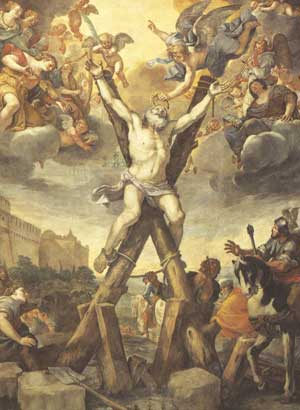
 HE ORATIONS for today’s feast of Saint Andrew are a fine example of the genius of the Roman Rite. That genius has become all the more clear through the 2010 English translation of the Missal. The new Missal, by its precision & fidelity, transmits many more nuances from the original Latin than the former Sacramentary had conveyed. In Andrew’s orations, the case is clear.
HE ORATIONS for today’s feast of Saint Andrew are a fine example of the genius of the Roman Rite. That genius has become all the more clear through the 2010 English translation of the Missal. The new Missal, by its precision & fidelity, transmits many more nuances from the original Latin than the former Sacramentary had conveyed. In Andrew’s orations, the case is clear.
The Collect uses four titles to describe Andrew, whom the Orthodox remember as the Πρωτόκλητος (“First Called”) among our Lord’s disciples. It is fitting that this first oration should incorporate titles, so as to recall the identity and role of the saint being celebrated. The titles in the Collect appear in this order: Apostle, preacher, pastor, and intercessor. These ideas were weakly captured in the Sacramentary thusly: apostle, to preach, guide, and friend. I find all four titles to be rendered with greater strength in the new prayer. Apostle is now capitalized, the label of preacher is stronger than the infinitive, pastor means much more than guide, and an intercessor is something far more defined (though not other) than a friend.
The new Prayer over the Offerings magnificently prays that the elements “which we bring” to the altar may please God “by what we have brought and be given life by what you have accepted.” The structure of the prayer highlights the action of bringing and receiving gifts in such a prominent manner that, as I offered Mass this morning, the prayer immediately called to mind the feeding of the five thousand, where it was Andrew who noticed the boy with the loaves and fishes and brought them to the Lord. This brilliant allusion is so subdued as to be unrecognizable in the former Prayer over the Gifts.
The Prayer after Communion, also, alludes to an aspect of this great saint’s life. It has long been held that Andrew was martyred on a cross in the form of a Greek chi, equivalent to the letter X. This tradition is obliquely referenced by the new oration in its request that “we, who carry in our body the Death of Christ, may merit to live with him in glory.” The marvelous Pauline language of that prayer had formerly been rendered into the anemic line, “By sharing in Christ’s suffering may we live with him for ever.”
These three orations inspire me not only to seek the intercession of Saint Andrew, but also to acknowledge the inherent genius of the Roman Rite. I am grateful to God that this genius now flowers forth more fully from the Roman Missal in English.
